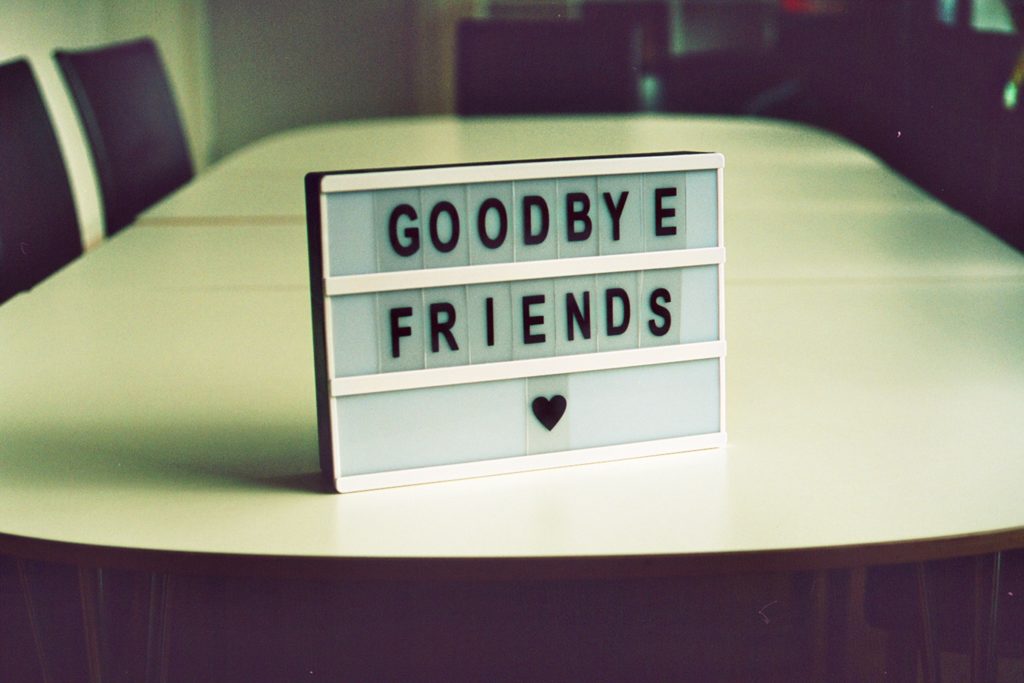Our family has never mastered the art of the swift exit.
At every family event, the goodbye sequence is a masterful display of postponement, an unspoken rule that keeps guests and their hosts engaged in conversation well beyond the stated end time of an event.

It usually goes something like this:
At some point, long after the event was to end, someone will announce half-heartedly “Welp, I suppose we better get going”. A few people will stand and make their way to the next room, some of the more ambitious will find their way to the front door.
Conversations continue. A few kids are found. And then they disappear again when they realize the grownups are still talking and ignoring their presence. These kids are smart, they’ve learned that ‘we’re leaving now’ really means they have yet another hour or more of play time.
Discussions are not elaborate. We discuss when we will visit next. We tell the host how great it was to see them. They will run back to the kitchen to wrap up some leftovers for the road. We launch a story about the last time that it took us two hours to leave and everyone laughs.
Our non-Minnesota spouses are sitting in the car waiting, visibly annoyed.
Eventually, everyone is found. A last round of hugs are given and the group pushes their way through the crowded entry way and pours into the street to their respective cars. The host will follow them and chat a little while longer while standing at the passenger side window. Eventually, the spouses slowly begin to pull away mid-sentence. We wave until the last car has faded from view.
We’ve joked about this over the years, calling it our Minnesota or Norwegian goodbye, assuming a Scandianvian origin. So of course, always the curious historian, I wondered if there was any truth to this beyond a story we’ve told ourselves as we linger, reluctant to say goodbye to our loved ones. Could it be that our DNA was actually to blame?
A deep dive into how to say goodbye
A simple google search will mention the Irish Goodbye, French exit, or English leave. But nothing from our northern heritage. Perhaps the Vikings didn’t bother with a long goodbye as they pillaged and ransacked.
When guests sneak out without letting anyone know, hinting at alcohol’s role in the whole matter, it’s called an Irish Goodbye. However, the Irish are not credited as the first to embrace the hasty leave.
In the 18th century, the English began to reference the French leave to describe the custom of departing a reception without saying goodbye to the host/hostess. It was considered efficiently polite to make a beeline to the front door and leave, without any pleasantries.
However, the Merriam-Webster dictionary defines the French leave as “an informal, hasty, or secret departure”, which hints at this being used more as an insult. The English, ever so subtle in their contempt for the French, would use this phrase to describe one abandoning their responsibilities (often military duties) without permission.
But as I was certain I should not be allowed to leave the enclosure, my only plan was to take French leave and slip out when nobody was watching.
— Robert Louis Stevenso
The French, throwing an insult back over the Channel, began using the phrase “filer à l’anglaise” or “to leave English style” or literally ‘flee English style’. A slang form of this phrase “pisser à l’anglaise” (pisser means to piss), implies the fleeing was due to a necessary but unsavory act of nature.
“I’ll follow you,” he told me, “But we can’t leave in the English way. Let’s say goodbye to Madame Verdurin,” concluded the professor.
— Marcel Proust’s In Search of Lost Time
Other languages also refer to these non-goodbyes:
- “wyjść po angielsku” — Polish for “to leave the English way”
- “sair à francesa” — Portuguese for “to leave in the French style”
- “polnischer Abgang” — German for “Polish exit”
- “уйти по-английски” — Russian for “to leave in the English way”
Today, this act of leaving without notice has gone from a cultural insult to a generational one. The millennials are often accused of ghosting – or “disappearing without a word.”
Despite my attempts to trace our family’s tendency for the long, drawn-out goodbye, I couldn’t find anything that linked it back to another country or time.
I did, however, find several references to the Minnesota Goodbye.
Urban dictionary describes it as this:
The act applying to most Minnesotans while visiting others in which, when one person has to leave, they proceed to talk for another hour, then the departing party is walked to the front door, where they talk for another hour, then the departing party gets walked to their car while the host family talks to them through the car window for an hour, and finally the departing couple SLOWLY departs down the drive, yelling back & forth with the host family.
The couple from Texas was extremely irritated by the Minnesota Goodbye they received while visiting their distant relatives.
How did this become a thing? My guess is that it all began as a way to entertain guests while their cars warmed up outside (Minnesota winters are brutal). Or, perhaps its roots can be found in our desire for collective politeness (very Scandinavian).
We would never depart without a word. If we did, how would our host know how much we appreciated them and their event? By saying goodbye multiple times, there’s no room for interpretation or later regret.
Recently at a party, my husband (of mostly English decent) suggested that we sneak out so not to call attention to our early departure. I was horrified at the prospect of leaving without a proper goodbye. We did sneak away, and I still harbor guilt so great that everytime I see my friend, I am compelled to mention JUST HOW MUCH FUN I HAD AT HER PARTY FIVE MONTHS AGO.
This type of lingering regret isn’t worth the hour or two that I may have saved by following how I was taught to say goodbye. So from here forward, I will embrace my family tradition for a proper and long goodbye.
To me, it’s much more civilized.
 In Honor of National Banana Bread Day (yes, this is a thing), Feb. 23
In Honor of National Banana Bread Day (yes, this is a thing), Feb. 23
